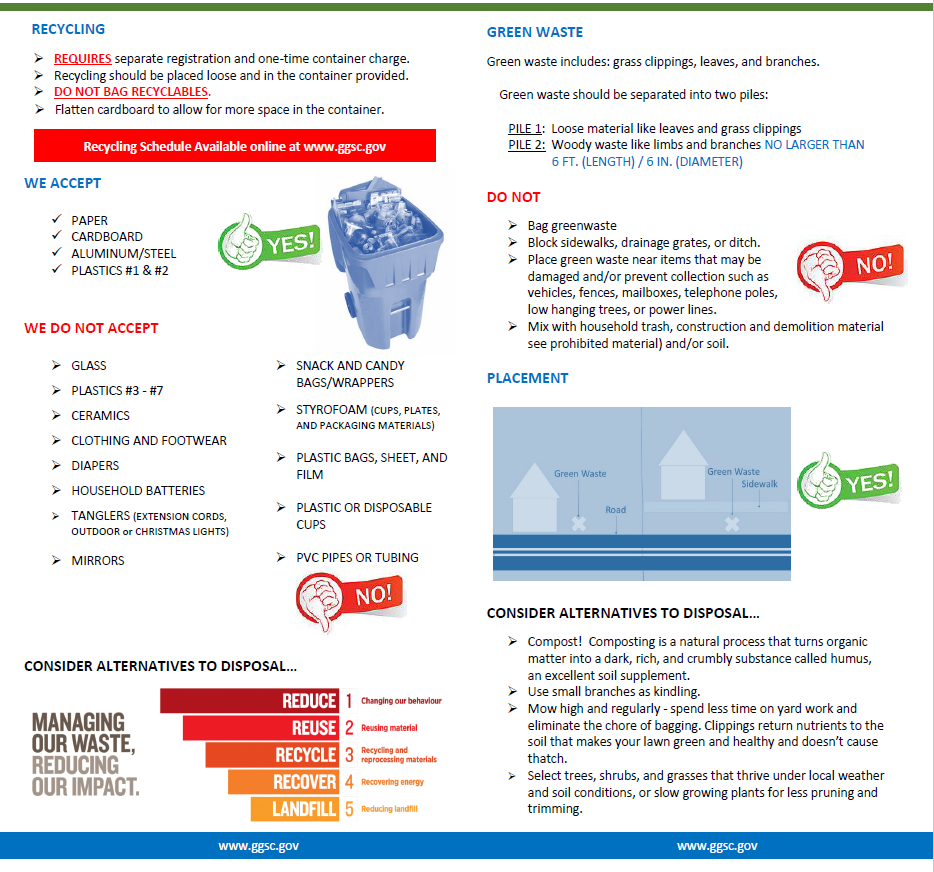From Landfills to Wastewater
All of our waste systems are connected, even if it is not immediately obvious. When trash makes its way to incinerators and landfills, it keeps that same garbage out of our wastewater systems, and from littering open spaces and water sources. Unfortunately, the more trash we produce, the more quickly those landfills fill up, and the more likely it  is that chemicals and gasses from trash are going to make their way into our atmosphere and groundwater. One of the best solutions to tackling this solid waste problem is to REDUCE our use of disposable goods. The next best solution is to REUSE those goods. There is no need to throw away that plastic zip-lock bag! Just give it a rinse and use it again. And then we get to yet another solution: RECYCLE!
is that chemicals and gasses from trash are going to make their way into our atmosphere and groundwater. One of the best solutions to tackling this solid waste problem is to REDUCE our use of disposable goods. The next best solution is to REUSE those goods. There is no need to throw away that plastic zip-lock bag! Just give it a rinse and use it again. And then we get to yet another solution: RECYCLE!
America Recycles
This America Recycles Day, let us take a moment to think about the impact of our connected systems. Every time we throw away a can or bottle rather than reuse it or recycle it (better yet, try reducing your use of these products altogether), we are adding to a steadily growing pile of garbage or incinerated trash that affects our environment and our water supplies. Landfills, for example, produce biogas made of carbon dioxide, water vapor, nitrogen, hydrogen, and nonmethane organic compounds that contribute to climate change and create smog.
An Urgent Call
The most problematic aspect of landfills is that they release methane gas. Methane is an odorless, colorless, flammable gas made up of carbon and hydrogen. It is a significant contributor to greenhouse gas, which exacerbates climate change and extreme weather patterns.
Landfills also have an impact on local communities since they quite literally take up space. Natural environments, which could otherwise be habitats for wildlife, must be set aside as a space to collect our trash. According to the University of Colorado, the average landfill size is 600 acres. There are more than 3,000 active landfills in the United States, taking up 1,800,000 acres of habitat that displaces local flora and fauna. Communities near landfills also experience decreases in housing values, and communities of color are disproportionately impacted.
What is of particular concern to those of us who work in the water and wastewater sector is the probability of landfills leaking contaminants into groundwater systems and polluting drinking water sources for those nearby communities.
Landfills are required to have plastic or clay linings, but these linings are only so resilient. Landfills produce a liquid called leachate, which contains high levels of ammonia that makes its way out of the linings and into ecosystems. At this point, it produces nitrates, which deplete oxygen supplies. This process, called “eutrophication,” creates “dead zones” where animals and some plant life cannot survive. Leachate also contains mercury and other toxins that also wind up in water sources.
How to Recycle Better
Recycling is an important step in reducing landfill waste, but it only counts if you recycle right. Be aware of your local processing guidelines to make sure you are sorting correctly and putting only accepted material into your recycle bins. Avoid “wish cycling,” or trying to recycle items that can’t be processed. And keep in mind that not everything can be recycled equally.

The process of recycling some items might take nearly as much energy as the process of producing that item anew. These are the types of items you might consider “reducing” from your everyday life, such as single-use water bottles. And last but not least, remember that many items need to be cleaned before you add them to your municipal bins, otherwise that might just wind up in the trash. See Reduce, Reuse, and Recycle Right: America Recycles Day Turns 25 to learn more!
